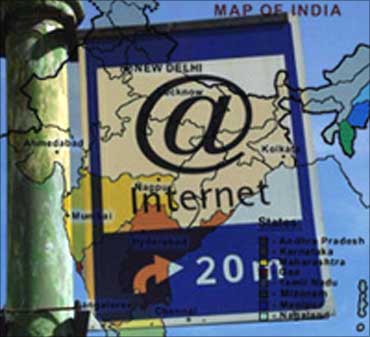 | « Back to article | Print this article |
By 2015, these 7 nations will have most Internet users
India will see its number of Internet users triple to 237 million from the current 81 million by 2015, according to a report.
In a study titled Internet's New Billion, the Boston Consulting Group has said that Brazil, Russia, India, China (BRIC) and Indonesia together will have more than 1.2 billion Internet users by 2015 -- well over three times the number of Internet users in Japan and the United States combined.
In 2009, the BRIC-I countries had some 610 million Internet users.
Here are a few interesting facts:
- There are 1.8 billion Internet users in the world currently.
- There are 32 countries with more than 10 million Internet users.
- The top 10 countries on the Internet together have 1.17 billion Internet users. That's 65% of all Internet users in the world.
- The top 20 countries on the Internet together have 1.47 billion Internet users. That's just under 82% of all Internet users.
- China and the United States make up for half of the Internet users in the top 15.
- Out of the top 20 countries, the five with the highest Internet penetration (not users) are: United Kingdom (82.5%), South Korea (81.1%), Germany (79.1%), Japan (78.2%), United States (76.3%).
- Seven out of the top 20 countries are Asian (35%).
- Five out of the top 20 countries are European (25%). Six (30%), if you also count Russia.
- Three of the top 20 are English-language countries (four, if you count India).
"Internet penetration rates in the BRIC-I countries will experience compound annual growth of nine to 20 per cent from 2009-2015, driven predominantly by young users who will form the digital-market eco-systems that will be in place for generations to come," the management consulting firm said.
With BRIC-I countries constituting many of the world's most populous nations, 'it may come as little surprise that their digital-consumer ranks will swell so quickly,' the report added.
While China tops the list with 650 million as the projected number of Internet users in 2015, Russia is likel to have 76 million.
Click NEXT to know which other countries feature in the list . . .
By 2015, these 7 nations will have most Internet users
1. China (650 million)
China is the world's fastest-growing major economy, with an average growth rate of 10% for the past 30 years. The country's per capita income was at $6,567 in 2009.
Despite the controversies that Google faced in China, the country leads as far as Internet users are concerned.
On September 20, 1987, China's first Net connection was established between Beijing and Karlsruhe University in Germany.
The first e-mail went out on September 14, 1987 with the message 'Across the Great Wall, we can reach every corner in the world'.
China had 420 million Internet users by June 2010. It is projected that China's Internet population will reach 469 million by the end of 2010, and the number will hit 718 million by 2013.
As a country, China ranks high on the world map in terms of economy, health and education.
China has a literacy rate of 91 per cent.
The productivity growth per person is $6,600. Services account for about 40 per cent of the gross domestic product.
Manufacturing contributes about 26 per cent of the GDP.
China records a low unemployment rate of 4.3 per cent. The healthy life expectancy is 66 years.
Click NEXT to read further . . .
By 2015, these 7 nations will have most Internet users
2. USA: 238 million
In the United States it all started in the late 1960s, when Defense Advanced Research Projects Agency developed a project called the ARPANET (Advanced Research Projects Agency Network).
The Internet, which grew out of this initial project, first gained a public face in the 1990s.
By 2004, three quarters of Americans had Internet access at home, and by June 2010 total number of Internet users stands 234.4 million.
Interestingly, in 2008, the United States ranked 15th out of 30 countries in broadband penetration rates.
The US economy is the world's largest national economy, with an estimated 2009 gross domestic product of $14.3 trillion (a quarter of nominal global GDP and a fifth of global GDP at purchasing power parity).
The US has a literacy rate of 99 per cent.
The productivity growth per person is a high $46,400. Services account for about 77 per cent of the GDP.
Manufacturing contributes about 18.46 per cent of the GDP.
The United States is the largest importer of goods and third largest exporter, though exports per capita are relatively low.
Click NEXT to read further. . .
By 2015, these 7 nations will have most Internet users
3. India: 237 million
Describing India as a 'low-maturity and high growth market', the Boston Consulting Group said that Internet penetration rate in India is expected to reach 19 per cent by 2015, up from the current 7 per cent.
"There are currently about 81 million Internet users in India -- a number that will nearly triple by around 2015 to 237 million," the report said.
India's Internet use is concentrated mainly in the larger cities, where many users are migrants from smaller towns. This group tends to have had limited exposure to the Internet and therefore typically has a narrower range of online needs than more experienced users.
With PC penetration still quite low, mobile phones are cheaper and more convenient tools for both communicating and seeking out entertainment.
For India, the next big growth opportunity should emerge from the rural market where penetration of mobile phones is far less than in urban markets, which have already begun to show signs of saturation.
Indians' mobile-phone activity is limited almost exclusively to phone calls and SMS, although only about half of India's 507 million mobile-phone owners use the latter. Just 5 per cent use mobile video.
"This could change when 3G and other forms of wireless broadband are launched in earnest."
Internet in India was established more than a decade ago as ERNET -- Educational Research Network. It was a joint undertaking of the Department of Electronics of the Government of India, and the United Nations Development Program.
Click NEXT to read further . . .
By 2015, these 7 nations will have most Internet users
4. Brazil: 155 million
The Internet was launched in Brazil in 1988, when the now defunct National Research Network was formed by the academic communities of Rio de Janeiro and S o Paulo.
It was introduced to the general public, in 1995. Brazilian Internet depended strongly on efforts led by the Federal government and the state-owned communications company Embratel and its holding, Telebras.
This changed in 1998, as a result of the privatisation of Telebras, and the blossoming of private groups such as Telefonica, Telemar and Brasil Telecom.
The Brazilian economy is the world's eighth largest economy by nominal gross domestic product and the ninth largest by purchasing power parity.
Brazil is one of the world's fastest growing major economies. Economic reforms have given the country new international recognition.
Brazil is a founding member of the United Nations, the G20, Latin Union, the Organisation of Ibero-American States, Mercosul and the Union of South American Nations, and is one of the Brazil Russia India and China countries.
Brazil is also home to a diversity of wildlife, natural environments, and extensive natural resources in a variety of protected habitats.
Click NEXT to read further . . .
By 2015, these 7 nations will have most Internet users
5. Japan: 101 million
Japan has the world's third fastest Internet connections (7.8 Mbps), delivering more data at a lower cost than almost anywhere else.
The speed advantage allows the Japanese to watch broadcast-quality, full-screen television over the Internet, an experience that mocks the grainy, wallet-size images Americans endure.
Overcoming the substantial barriers erected by the Japanese government to the introduction of the Internet, promoters and entrepreneurs managed to create a flexible and dynamic Internet society.
From a slow start, Japan has emerged as the global leader in the mobile Internet.
Japan has a productivity growth per person at $32,600.
While services account for about 69.30 per cent of the gross domestic product, manufacturing contributes a high of 21 per cent of the gross domestic product.
Japan scores 5.51 in terms of innovation. In ease of doing business, the country ranks 15th: it takes 23 days to start a new business. The country records a low unemployment rate of 5.6 per cent.
Click NEXT to read further . . .
By 2015, these 7 nations will have most Internet users
6. Indonesia: 94 million
The Internet has been in Indonesia for serveal years. Yet, its growth is not exponential as in other countries.
A recent survey reported that the Indonesian Internet user's growth is 33% yearly.
Indonesia has a market economy in which the government plays a significant role.It is the largest economy in Southeast Asia and a member of the G-20 major economies.
Indonesia's estimated gross domestic product (nominal), purchasing power parity aside for 2008 was $511.7 billion with estimated nominal per capita GDP at $2,246, and per capita GDP PPP at $3,979.
Click NEXT to read further . . .
By 2015, these 7 nations will have most Internet users
7. Russia: 76 million
It all started in january 1990 with the creation of the social organisation Glasnet (Glasnost + Network).
The name and funding was provided by San Francisco based Association for Progressive Communication.
IT provided grants, which financed Internet work for teachers, human rights workers, ecologists, informal groups and other guarantors of the open society.
In 1993, Glasnet became a commercial provider.
Russia still has some e-addresses that have existed since 1991, which were among the first 150 Russian (or, rather, Soviet) electronic addresses.
In 1994, Russia opened its first website - Moscow Libertarium. It is one of the oldest sites on the Russian Internet and is supposed to be among the first 3,000 WWW sites in the world.
Russia has the world's 6th largest economy by nominal gross domestic product or the seventh largest by purchasing power parity, with the fifth largest nominal military budget. It is one of the five recognised nuclear weapons states and possesses the world's largest stockpile of weapons of mass destruction.
The economic crisis that struck all post-Soviet countries in the 1990s was nearly twice as intense as the Great Depression in the countries of Western Europe and the United States in the 1930s.
Even before the financial crisis of 1998, Russia's gross domestic product was half of what it had been in the early 1990s.







